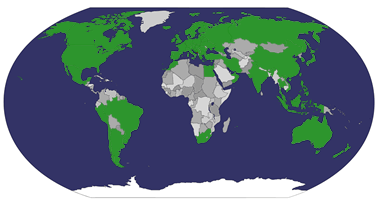
Bahiana woman in traditional costume, Pelourinho, Salvador, Bahia, Brazil (UNESCO WHS)
Salvador is a city on the northeast coast of Brazil and the capital of the Northeastern Brazilian state of Bahia. Salvador is also known as Brazil's capital of happiness due to its easygoing population and countless popular outdoor parties, including its street carnival. The first colonial capital of Brazil, the city is one of the oldest in the country and in the New World; for a long time, it was also known as Bahia, and appears under that name (or as Salvador da Bahia, Salvador of Bahia so as to differentiate it from other Brazilian cities of the same name) on many maps and books from before the mid-20th century. Salvador is the third most populous Brazilian city, after São Paulo and Rio de Janeiro, and it is the ninth most populous city in Latin America, after Mexico City, São Paulo, Buenos Aires, Lima, Bogotá, Rio de Janeiro, Santiago and Caracas.
The city of Salvador is notable in Brazil for its cuisine, music and architecture, and its metropolitan area is the wealthiest in the northeastern region of the country. Over 80% of the population of metropolitan region of Salvador has Black African ancestry. The African influence in many cultural aspects of the city makes it the center of Afro-Brazilian culture. The historical center of Salvador, frequently called the Pelourinho, is renowned for its Portuguese colonial architecture with historical monuments dating from the 17th through the 19th centuries and has been declared a World Heritage Site by UNESCO in 1985.
萨尔瓦多(Salvador,全名São Salvador da Baía de Todos os Santos,意为“万圣湾边的圣萨尔瓦多”)是巴西西北的一座滨海城市,巴伊亚州的首府。萨尔瓦多很长时间里直接被称为巴伊亚,20世纪中前的许多书和地图中它就被标为巴伊亚(比如在丹尼尔·笛福著的《鲁宾逊漂流记》中)。今天当地许多人依然将巴伊亚作为萨尔瓦多的称呼,而巴西其他许多人则将该州称为巴伊亚。
萨尔瓦多位于大西洋畔的一个半岛上,离托多斯奥斯圣托斯湾很近。它是当地都市地区的中心。2002年其人口为254万人,是巴西的第三大城市。
萨尔瓦多分上城(cidade alta)和下城(cidade baixa),大教堂和管理机构位于上城。市内依然有许多殖民时期的建筑,包括巴西的第一座大教堂和最老的医学院。萨尔瓦多也以其受非洲文化的影响而著称,市内大多数居民是非洲后裔。它是巴西黑人武术的中心。市内有许多教堂(350多座),因此也被称为“黑罗马”。市内的食品、音乐和生动的文化生活也受非洲文化的影响。
References sources : wikipedia


























 Postcards received from
Postcards received from 








































































0 comments:
Post a Comment